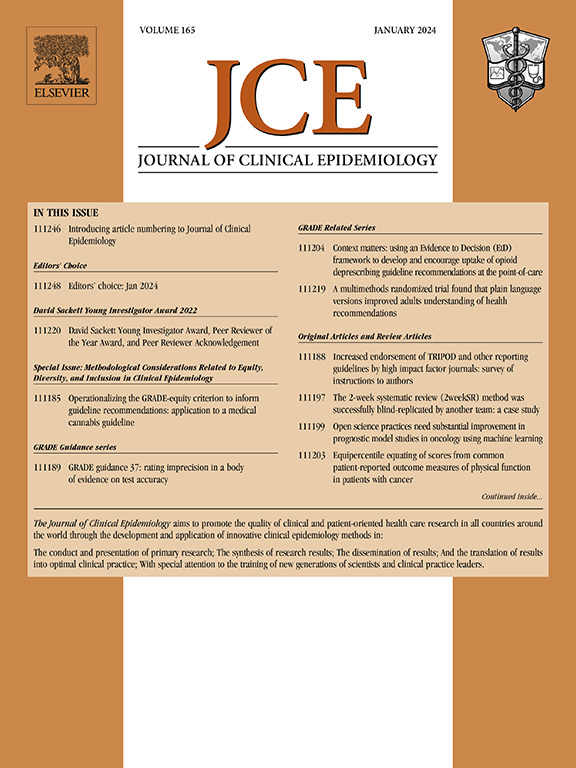调整世卫组织2019冠状病毒病生活指南,平衡方法严谨性与效率和灵活性:来自阿根廷的案例研究。
IF 7.3
2区 医学
Q1 HEALTH CARE SCIENCES & SERVICES
引用次数: 0
摘要
目的:我们从指南制定小组(GDG)的角度评估了关于在阿根廷翻译和调整世界卫生组织COVID-19生活指南(WLGC-19)治疗方法建议的新方法过程的看法。方法:作为MAGIC证据生态系统基金会GATEWAY项目的一部分,量身定制的适应过程与原型工具相关联,首先评估建议和理由,然后检查决策因素的证据。我们将评估重点放在2022年12月至2023年6月期间实施的适应进程步骤上。我们通过1)小组会议的观察,2)方法小组的焦点小组,3)小组成员的半结构化访谈,4)小组会议后的调查和5)满意度调查来收集信息。我们对调查进行了描述性分析,对焦点小组和访谈进行了内容分析。结果:GDG采纳了四项建议,其中两项建议在方向或力度上进行了修改,并重新阐述了一项建议。调查显示,大多数GDG认为培训课程(89%)和小组前会议调查(100%)促进了适应。焦点小组和访谈显示,gg同意该过程考虑了有关的当地因素以适应建议,并且它是透明和易于理解的,使其能够有效地达成共识。GDG重视流程的灵活性和时间优化。他们认为会前调查分析对促进达成协商一致意见至关重要。结论:从GDG的角度来看,本案例研究表明,这种量身定制的方法为WLGC-19的翻译和改编提供了一种透明、高效和严谨的方法。本文章由计算机程序翻译,如有差异,请以英文原文为准。
Adapting World Health Organization COVID-19 living guidelines balancing methodological rigor with efficiency and flexibility: a case study from Argentina
Objectives
We assessed the perceptions about a new methodological process to translate and adapt the World Health Organization living guidelines for COVID-19 recommendations for therapeutics in Argentina from the guideline development group's (GDG) perspective.
Methods
A tailored adaptation process, linked to a prototype tool and created as part of the GATEWAY project by the MAGIC Evidence Ecosystem Foundation, starts by assessing the recommendation and justification and then examining evidence to decision factors. We focused our evaluation on the adaptation process steps carried out from December 2022 to June 2023. We collected information through (1) observations of the panel meeting, (2) focus group with methods team, (3) semistructured interviews with panel members, (4) postpanel meeting survey, and (5) a satisfaction survey. We carried out descriptive analyses of surveys and content analysis of focus groups and interviews.
Results
GDG adapted four recommendations, of which two were modified in direction or strength and elaborated one de novo. The survey showed that most GDG members found the training session (89%) and prepanel meeting survey (100%) facilitated adaptation. Focus groups and interviews showed that GDG agreed that the process considered the relevant local factors to adapt the recommendations and that it was transparent and easy to understand, allowing it to reach a consensus efficiently. GDG valued the process's flexibility and time optimization. They considered the premeeting survey analysis crucial in facilitating the consensus.
Conclusion
From the GDG perspective, this case study demonstrated that this tailored approach provides a transparent, efficient, and rigorous methodology for translating and adapting the World Health Organization living guidelines for COVID-19.
求助全文
通过发布文献求助,成功后即可免费获取论文全文。
去求助
来源期刊

Journal of Clinical Epidemiology
医学-公共卫生、环境卫生与职业卫生
CiteScore
12.00
自引率
6.90%
发文量
320
审稿时长
44 days
期刊介绍:
The Journal of Clinical Epidemiology strives to enhance the quality of clinical and patient-oriented healthcare research by advancing and applying innovative methods in conducting, presenting, synthesizing, disseminating, and translating research results into optimal clinical practice. Special emphasis is placed on training new generations of scientists and clinical practice leaders.
 求助内容:
求助内容: 应助结果提醒方式:
应助结果提醒方式:


